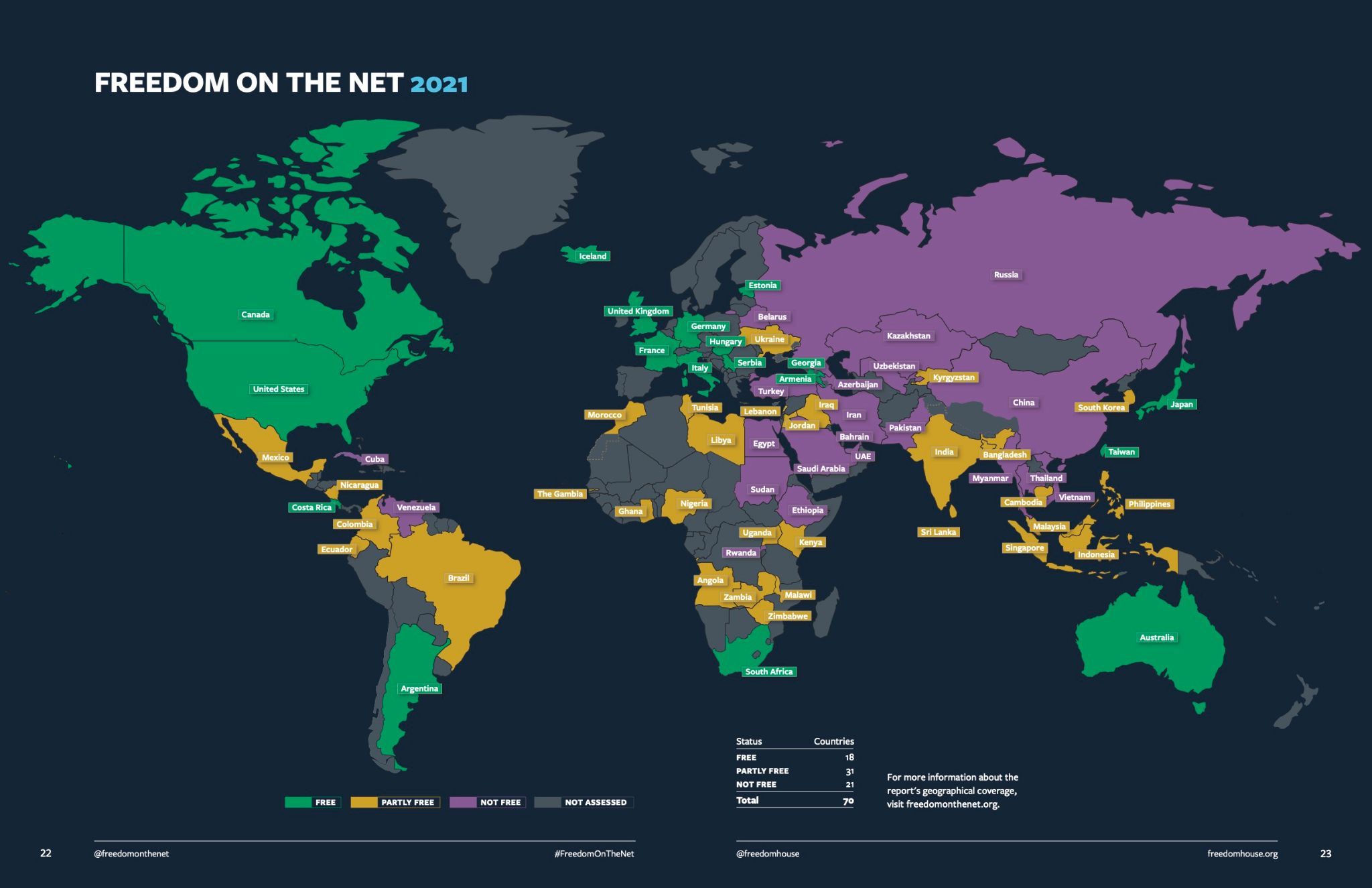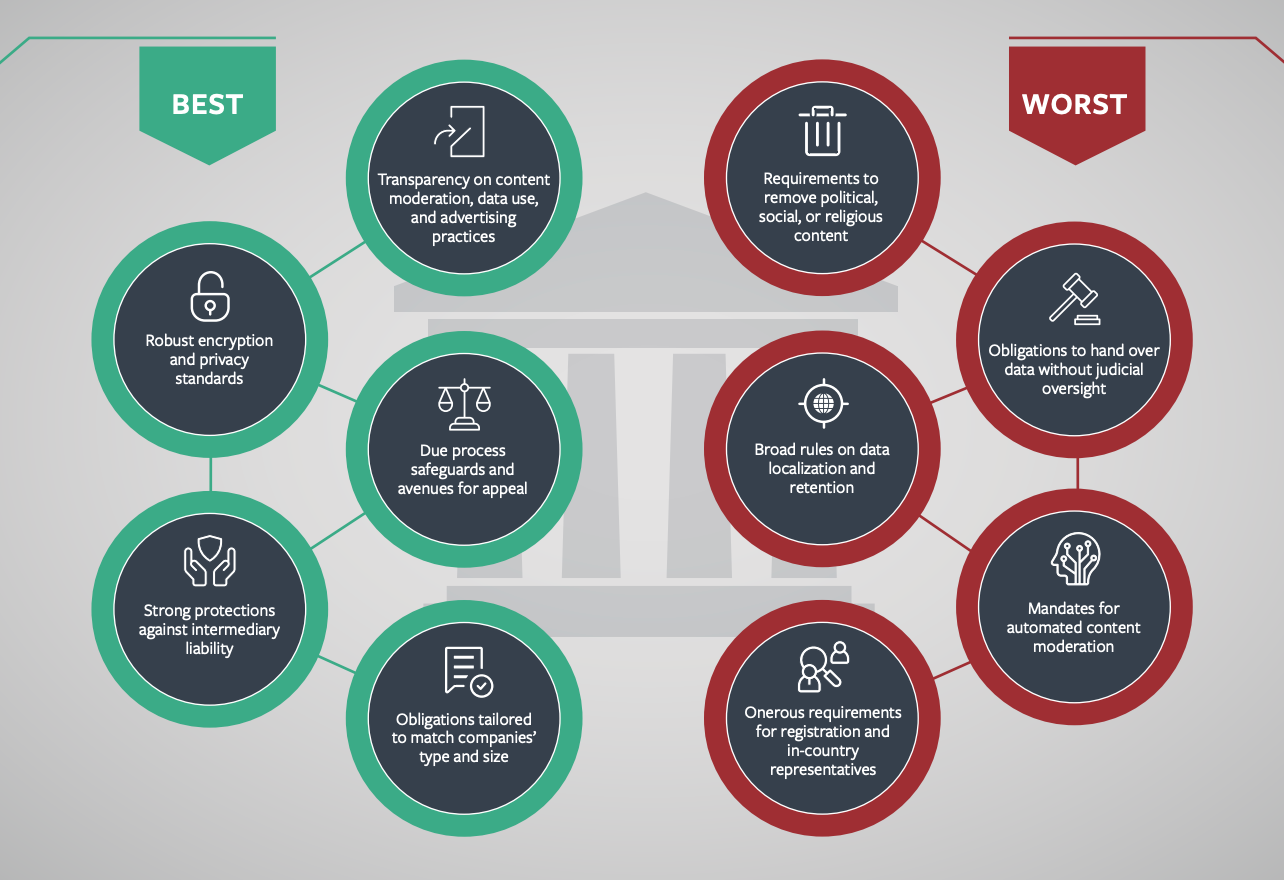Revenge of the State: Freedom House Finds Tech Increasingly Serves Authoritarian Ends
Justin Hendrix / Sep 21, 2021Freedom House, a nonprofit organization founded in 1941 to advance democracy and human rights, has released its annual report on human rights and digital technology, Freedom on the Net. The survey of 70 countries -- representing 88% of the global population -- finds most measures moving in the wrong direction, with global internet freedom on the decline every year since the first report was published just over a decade ago.
In a year that saw “a record-breaking crackdown on freedom of expression online,” Freedom House now assesses that 75% of the world’s online population lives under governments that have arrested or imprisoned people “for posting content on political, social, or religious issues,” and 72% “live in countries where individuals have been attacked or killed for their online activities” over the past year.
I unpack some of the report’s broader themes and also turn to its findings with regard to three countries: the United States, India, and China.
If there is a key theme amid the gloomy details, it is the general shift toward more aggressive government intervention across the globe. Allowing for the fact that in some countries -- particularly democracies -- these interventions may reflect “legitimate attempts to mitigate online harms, rein in misuse of data, or end manipulative market practices,” the overall trend is toward more censorship, surveillance and generally authoritarian behaviors. Faulting the United States’ “laissez-faire approach to the tech industry,” report authors Adrian Shahbaz and Allie Funk say that the failure of Washington to set rules for Silicon Valley has left the path open to “authoritarian manipulation, data exploitation, and widespread malfeasance,” as many states seek to enlist tech firms in repression of their citizens.

Conditions in three countries that represent a healthy proportion of the online population of the nations surveyed illustrate the broader trends: the United States, which faces democratic erosion; India, a hobbled democracy that has succumbed to the authoritarian impulses of its nationalist government; and China, a case study in technology-enabled repression.
The United States: Free
While noting the historic strengths of U.S. democracy, the authors explain that digital freedoms “declined in the United States for the fifth straight year” even as “the spread of false and conspiracist content about the November 2020 elections shook the foundations of the American political system, culminating in outgoing president Donald Trump’s incitement of a violent mob to halt the certification of the election results on January 6, 2021.” The report states that the overall decline in internet freedoms comes alongside other forms of democratic erosion, including “partisan pressure on the electoral process, bias and dysfunction in the criminal justice system, flawed and discriminatory policies on immigration and asylum seekers, and growing disparities in wealth, economic opportunity, and political influence.”
Where the United States loses net points on the Freedom House scoring system, it is due to erosion of the information environment due to the saturation of “disinformation,” particularly involving elections and the COVID-19 pandemic; the surveillance of private and social media communications related to political protests, especially Black Lives Matter; cost and competition limitations to broadband access; and efforts by some officials to intimidate or force people or publishers to delete content. While Freedom House does not speculate what would have happened to the country's standings if Trump had secured re-election, either by legal means or otherwise, presumably it would have resulted in a more substantial decline.
The report takes stock of efforts in Congress to reform Section 230 of the Communications Decency Act, which generally provides online sites and services with immunity from liability for the activities of their users, but finds most congressional reform efforts are “premised in part on claims of political bias against conservative viewpoints” while there is “scant evidence to support such claims.” Likewise, the report notes that several states “proposed bills aimed at regulating social media companies’ content moderation, including Texas, Kentucky, Arizona, and North Dakota,” referencing an analysis of the bills that says they are likely unconstitutional. Similarly, the report references a Florida law introduced by Governor Ron DeSantis that would have prevented social media platforms from permanently suspending the accounts of political candidates, an act that met with a preliminary injunction from a federal court citing “First Amendment concerns.”
India: Partly Free
The government of Prime Minister Narendra Modi and his Bharatiya Janata Party continues to erode the freedoms of Indians online. The past year witnessed the passage of new Information Technology Rules, which “imposed broad obligations on large social media companies to further moderate online content, undermine[d] end-to-end encryption, and increased retention of personal data” and the institutionalization of a code of ethics intended to “guard against purported threats to sovereignty and national security.” As a result, the report’s authors assess that internet freedom in India declined for a fourth straight year. The government also banned over 100 Chinese apps, shut down the internet in parts of the country to quell protests, and called on U.S. tech firms to “take down content criticizing authorities, shared by opposition figures, journalists, activists, and ordinary users.” All of that is before considering what has happened in territories such as Kashmir, which is not covered in this report.
Just under 60% of India’s nearly 1.4 billion people are online. But those who do have internet access are subject to a government that is the “global leader in the number of internet shutdowns imposed,” with local authorities restricting access for a variety of reasons, including limiting protests and the spread of disinformation to stopping “cheating on school exams.” The government also engages in ISP blocking to restrict access to websites that advance positions it finds objectionable, and has ordered Facebook, Instagram and Twitter to restrict posts related to the government’s response to the COVID-19 pandemic and the protests of farmers against new agricultural laws.
China: Not Free
“Conditions for internet users in China remained profoundly oppressive, and confirmed the country’s status as the world’s worst abuser of internet freedom for the seventh consecutive year,” says Freedom House, pointing to draconian censorship of information and criticism of the government related to the COVID-19 pandemic as well as “severe legal repercussions for activities like sharing news stories, talking about their religious beliefs, or communicating with family members and others overseas.” The Chinese Communist Party has “exerted even greater control over the press, film, radio, and television industries in recent years, including online video and streaming services,” and the country now boasts “the world's most sophisticated internet censorship apparatus.”
Unlike the United States, the Chinese government seems motivated to limit the power of its technology giants and their “exploitation of user information.” Perhaps counterintuitively, while it maintains a pervasive surveillance state, China now has a far more substantial privacy regime than the United States that limits what personal data its companies can collect -- the authors surmise this is about limiting corporate autonomy and power. China’s Information Protection Law draws on the European Union’s General Data Protection Regulation (GDPR) framework. But even as it shows some interest in instituting privacy protections due to popular concerns, the government is brutal in its treatment of minorities. “In Xinjiang, some of the estimated one million Uyghurs and other Muslims were taken to reeducation camps as a result of their online activities, such as downloading WhatsApp, possessing the contact information of prominent Uyghur scholars [presumably to engage in online communications], or simply clicking on links on their mobile phones.”
Best practices to preserve digital freedoms
The news is not all bad. A nation of just over 350,000, Iceland scores best. And the report points to progress in some countries, such as a promising new data privacy law in Ecuador, and efforts in The Gambia to hold its mobile providers to account. The island democracy Taiwan appears for the first time on the chart, ranked fifth for its “vibrant online landscape supported by meaningful and affordable internet access, an independent judiciary that protects free expression, and a lack of website blocks,” as well as a robust effort to resist Chinese manipulation.
What has emerged over time is a set of “best practices” which help ensure freedom, and “worst practices” that indicate its absence (see Chart below). On the positive side of the ledger, the report highlights virtues of transparency on content moderation, for instance, alongside the increasing importance of encryption and obligations for tech firms that are “tailored to match companies’ type and size.”

To the extent that doing business abroad exposes them to the worst practices, “U.S. firms are going to have to take a hard look at whether they should operate in certain environments,” report author Adrian Shahbaz said in a press briefing. Whether the business interests of U.S. tech firms will outweigh the purported commitments to liberal values is an open question. Shahbaz pointed to the capitulation of Google and Apple to Russian authorities that sought to cripple an app operated by Alexei Navalny, a main opposition figure critical of Russian President Vladimir Putin. Needless to say, Russia ranked poorly on the Freedom House survey.
This article is published in collaboration with Just Security.
Authors
